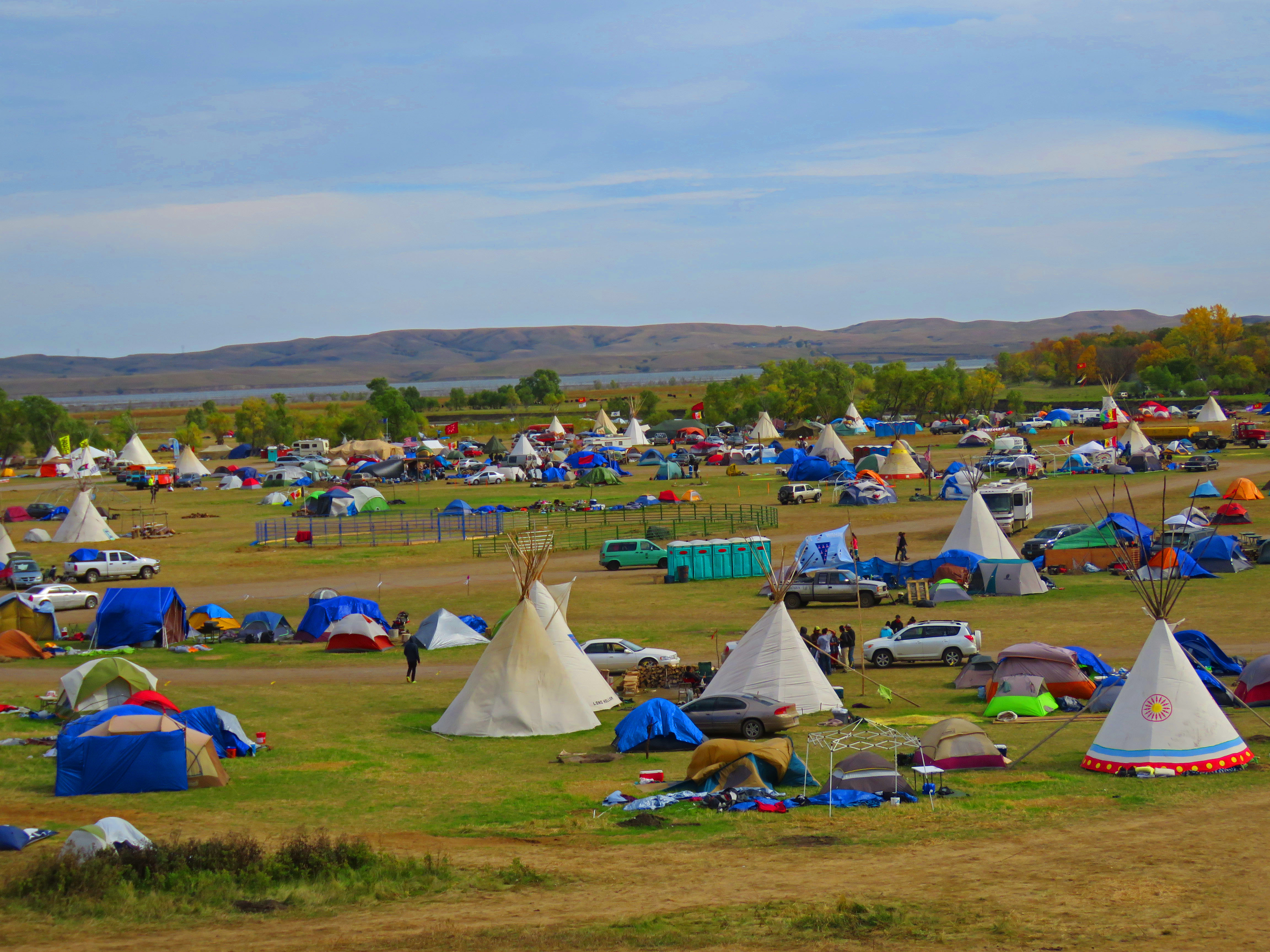Standing Rock Sioux Protest is About More than Stopping One Pipeline –

A wide angle view of the overlow Sacred Stone camp where the Cannon Ball and Missouri Rivers converge in Cannon Ball, N.D.: Glynn Wilson
By Glynn Wilson –
CANNON BALL, N.D. – Justice Rowland, a young Lakota man camped out in the overflow Sacred Stone camp here, grew up in Wounded Knee, South Dakota. But back in April when he heard about the Standing Rock Sioux protest over the Dakota Access pipeline, he came and joined the growing movement.
Watch the video interview here:
Now in its eighth and perhaps most critical month, since winter is coming to the high plains, Native Americans of all tribes and environmental activists from all over the country and the world have joined the cause, which is seen as a historic battle on the front lines of saving the planet for future generations from horrific effects of drastic climate change from global warming due to the continued burning of fossil fuels for energy.
Rowland says he is here to “tell our version of our story that has been white washed or erased in U.S. history.â€
Ever since the Obama administration temporarily halted the pipeline construction after a federal judge in Washington, D.C. refused to grant a restraining order to permanently halt the work, young Native Americans from many tribes across the country have joined the protest and moved into the camp at the confluence of the Missouri and Cannon Ball rivers.
An army of transient environmental activists have also joined them, taking advantage of the free camping, piles of donated firewood and daily meals served by the Standing Rock Sioux with food donated by other tribes.
Reporters and photographers are not allowed in the original Sacred Stone camp on the reservation on the north side of the river, where taking pictures and shooting video is prohibited. Yes, Native Americans are still sensitive about having their pictures taken, although they know the pictures and video are critical to get the word out on their cause.
Most of the print, broadcast or web reporters who come to cover the protest tend to stay in the hotel by the tribe’s Grand River Casino 10 miles down the road to the south. But we camped for three days and two nights in the overflow camp set up on federal land south of the river where most of the protesters hang out, waiting for an announcement at the central council fire that it is time to march to the site of the pipeline construction just down the road.
Rowland says he was taking part in the protests at first.
“But now there are enough people here I don’t think I should have to go every time,†he said. “In fact I don’t go at all anymore. I don’t want to get arrested.â€
When asked about the cause, he says it is the right of native people to defend themselves and their land and water.
“It is our treaty right to defend what is ours,†he said. “The treaty is the supreme law of the land. And America has yet to honor their treaties with indigenous peoples, the first nations.â€
He explains to anyone who will listen that the Dakota Access pipeline is an “expansion pipeline†to replace two older pipelines already running through the river nearby.
“The companies are not going to clean up their old mess. They are going to leave it,†he said. “They are going to put up their big new mess, this black snake that threatens us now.â€
There is a larger reason for the protest, he says, beyond just the building or halting of one oil pipeline. It is all about making people wake up to the destructive lifestyle they are living and getting them to make changes to ensure a sustainable future.
“Most people in America live in a lie and an illusion,†he said. “I call it a bubble. I like breaking those bubbles. People need to wake up and use their conscious thinking and take action.â€
He says indigenous people are very conscious of what happens on this continent, and of the treaty rights set out in the Louisiana Purchase of 1803.
“We hold those keys to god’s gate,†he said. “Those happy hunting grounds? That is ours. We protect that.â€
He said while Native Americans now make up less than one percent of the U.S. population, “we are the people who own most of the mineral rights.â€
“That has all been stolen from us, swindled away from us,†he said. “We have been forced into little concentration camps called reservations, just like Palestinians or Jewish people. This movement is about us leaving the reservation. It’s probably time for us to leave that concentration camp. The continuation of the holocaust that hit us in the beginning is still happening.â€
As he expresses the Lakota point of view, the entire continent is treaty land, and it is time for the holocaust to end.
“Anywhere we go we are reclaiming our land, which continues to be occupied by European Americans,†he said. “We have the absolute use of the land. Fishing. Hunting. Collecting wild berries. Wild game. Everything.â€
That includes the national parks, which may technically be owned by “the people†in the form of the federal government, but are being turned over more and more to private corporations for profit.
“As tribal people we can go in those parks and do what we want, any park across the country,†he said. “We can collect our medicines. We can live there. It is our treaty right to use that land.â€














Excellent interview and a good read.